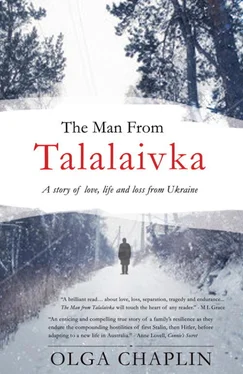Now the bunkers were overgrown with forgiving vegetation of these past four springs. Behind him, to the north-east, and beyond the Tosted forest in which they laboured, Hamburg now bustled, its growing international flavour heightened by the surprising events of the past year. Below him, the camp sprawled even beyond its original boundaries, as new refugees arrived and were dispersed to far away places, whilst others, like him and his family, still remained.
“Ah, Petro!” Borys waved and stepped up to greet him. “Here you are at last! What, it is not enough for you to work at your logs all week, that you must test your strength again on Sundays at the farm? Come, Petro, drink with us! Today we can all find reasons for celebration! Be happy for us, my friend! We may yet see you and your family in America as well!”
Borys handed him a mug with its clear elixir. The shot of vodka scorched his throat, burned deep in his chest, fired sharp sensations at his brain. He had forgotten how fast, how active this elixir was. It shot deep beneath his optimism and his logic, disengaged and relieved the pain of his anxiety and uncertainty that lurked daily, hourly, as he awaited their fate. For those few moments the countryside faded, the sun’s generous shedding of afternoon’s rays blurring his vision. He was transported to another hill, thousands of kilometres away, all those years ago, to his father’s hillside land, to the sweet smell of summer’s Ukraine.
Tears welled, confusing sensations competing with his composure: pain of the past, anxiety of the present, released by the vodka’s potency, surfacing and over-riding his controlled emotions. Now it was autumn, and September 1949. He was not celebrating his father’s hard work in his own Ukrainian land, but those of the German conquerors who had just gained their freedom in their new western Republic, witnessing, at this very time, a new phase of government and leadership under a true democracy. He was happy, now, for these conquering people, who had gone through much suffering, but he felt even more painfully the sense of his ‘displacement’.
He swallowed hard, drank the dregs of the tumbler’s potion, and took some home-brewed schnapps proffered him, fired his mind to Borys and Hryhori. Fortune had smiled on them, the haphazard American migration openings picking such young men and their brides at a time when so many ships were diverted to Ben Gurion’s new Israel, a priority over all other migration. He smiled generously as he listened again to their good fortune, glad for them that their wishes were met.
Yet his heart sank anew. The element of luck played a great part in this last migration. He consoled himself that his family’s chances were good, still. Four long seasons had passed since his fateful interview with the cautious German migration officer, and still no word of their prospects even though, recently, they had had inoculations under the new banner of the International Refugee Organisation, in preparation for a possible fortunate outcome. Yet there were still no promises, no guarantees. All they could do was wait, and wait. And celebrate this hillside party, and western Germany’s elections, that had been the cause of so much consternation and, now, excitement.
“Dear God,” he pleaded silently. He hoped fervently this new government could signal that he and Evdokia would not be transported, even at this stage, back to Stalin’s Russia and the obligatory labour camps, as had recently happened, inexplicably, with some of the camp’s ‘displaced persons’. He prayed his information to the migration officer would hold. In such uncertain times, all was fluid, even quicksand. The four years’ encampment at Heidenau could still count for nothing, if some untrue or malevolent information fell in unsympathetic hands.
He sighed philosophically, his psyche of these past years matured now to accept uncertainty and inconsistency in this ‘new world’ of freedom in bondage, democracy in a split new nation state, immense international goodwill and welfare in an unrelenting daily climate and blast of Cold War diplomacy, and outbursts of Stalin’s belligerence in his threats of reprisal, even as the Berlin blockade ended and ‘normalcy’ resumed.
He watched as a group of men and women, with giggling children, stepped out a traditional dance in a clearing: the women’s skirts brushing the nettles, thorns stopping them in their turns, their laughter as they faltered. He smiled, in spite of himself. He thought of the steps he took in life, turning this way, then that, doing everything possible to stay alive, keep his little family together. It was a haphazard, unpredictable dance he negotiated, almost like a minefield in this political and social milieu of a new Germany, that still was strapped with the problems of recent war. Yet his heart still held hope. He desperately wanted to increase his family’s chances for safety, and happiness, one day.
“Aha, Petro! Here is our song! Come! I know you are in good voice, my friend, when the throat is whetted!” Hryhori slapped his back and cued in the tune, as a Polish folksong ended and strains of their Ukrainian were chorused. Peter laughed and drew his arm over his friend’s shoulder, tousling his daughters’ hair as they stepped to join their waiting friends, his eyes teasing Evdokia to follow them in song. “Xodite, xodite, nashi xloptsi i ridni…” The vodka and schnapps had kicked in: his natural wit and humour and optimism came to the fore. He confidently led the men in heartfelt verse, to the applause of those around them. “Od moyi ochi padyt sloze… Ale me do novi domue yidem…”
The accordion, Christos’s balalaika, another’s harmonica, raised them in crescendo:
“Come on, come on, good men and loved ones…
Though tears flow freely as our hearts are aching…
We will find our new abodes in other havens…”
He embraced the camaraderie as he joked with Evdokia and their friends, felt delighted at how easily his witty regaling could make them laugh. Music filled the hillside, the chorus was raised ever higher: the celebration of a community of nationalities imprinted in their memories before they scattered to, as yet unknown, parts of the globe.
In the distance, trudging up the long pathway from the camp, several guards in unfamiliar uniform headed for the revellers. The accordion quietened, the balalaika strings paused. Someone steered them towards Peter’s group and pointed to Peter. Instinctively, his stomach shut tight, all those years of habitual fear and anticipation over-riding even the schnapps and vodka looseners. Aware he was being singled out, he whispered to Evdokia to console her, pretending the camp commandant had information for him, and stepped forward.
“What is it, sir?” he called out to the senior guard, who was already displaying his badge. “Please don’t concern yourselves to climb further… I will come to talk with you.” His friends, emboldened with drink, waved him on: “Good man, go and tell them, you are one of us, and you are ‘clean’!” He followed the officials to the level ground as the temporarily quietened party again took up song.
“Herr Pospile,” the senior official addressed him, his shiny Polizei insignia adding gravity to his orders, “you are instructed to attend a Police hearing tomorrow morning at the Heidenau/Tosted Police quarters with our senior Police Administrator. I am instructed to inform you that you will not be told prior to the appointment the nature of this matter. Your camp commandant has been advised. He will arrange your transport to the Police Headquarters. Are you clear about these instructions? You are advised not to miss the appointment, as it will be viewed gravely, and will go against you.” Peter nodded thoughtfully, thanked the police guards for their duty. They quickly saluted, as if still on wartime patrol. He returned a short salute. His early training and years of army service instilled a respect for these government officials.
Читать дальше












